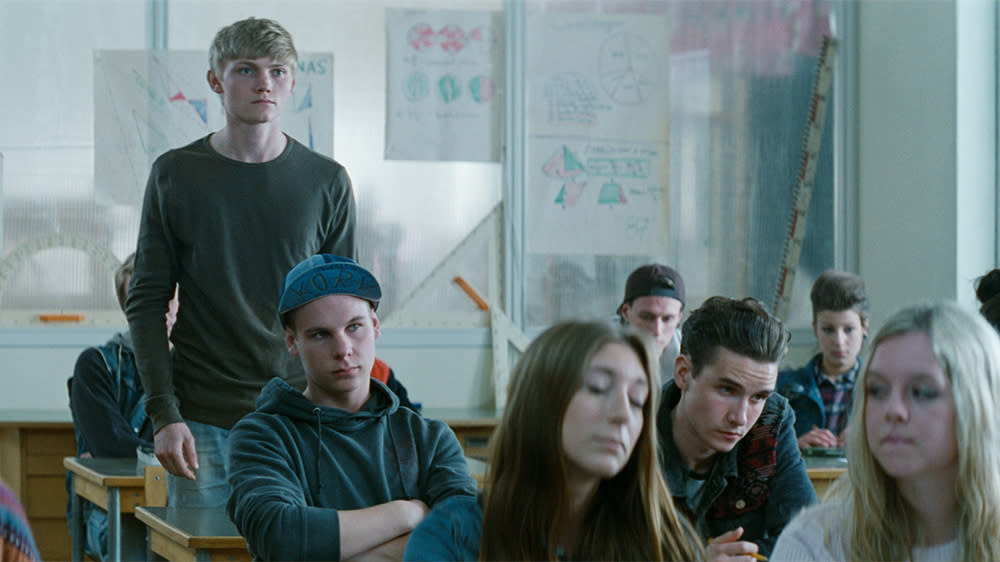Cannes Film Review: ‘The Here After’

The kids are not all right in “The Here After,” a cold, controlled, minimalist drama about the aftermath of a crime committed by a teen in contempo rural Sweden. Mirroring the milieu of his tale, where repressed emotions eventually run amok, Sweden-born, Poland-trained helmer-writer Magnus von Horn withholds traditionally expected narrative information, revealing only gradually the reason for the locals’ hostility toward his protagonist, thus making spoilers an inevitable part of any synopsis. This style of storytelling will not be to all tastes, but the pic should serve as a calling card for fests on the lookout for new talent.
The action kicks off as John (Ulrik Munther) leaves an unidentified, locked-down institution in the company of his controlling father (Mats Blomgren). Back at the family farm, John wrestles with young brother Filip (a winning Alexander Nordgren) and helps with chores. But there’s no discussion of where he has been, how long he has been away or why.
The emotional disconnect in John’s nuclear family is echoed by the fraught relationship between his father and ailing grandfather (Polish thesp Wieslaw Komasa). The near-mute older man, who apparently was a martinet in his day, retains a mean streak; he would rather shoot a sick dog than take it to the vet. Eventually, it becomes clear that most people in his small community are not happy to see John. Former friends glare and a woman attacks him at the grocery store. Although the audience has not yet learned what crime he committed, it is obvious that it has not been forgiven or forgotten by his cohort or their parents.
The lynch-mob atmosphere thickens in ways that sometimes recall Thomas Vinterberg’s “The Hunt” when John returns to his former school. Other students shun him in the classroom, trip him in the cafeteria, and punch him by his locker. Why doesn’t he respond in kind, wonders rebellious new girl Malin (the lively Loa Ek), whose questions finally elicit the essential background information.
Helmer von Horn, here making his feature debut, lives in Warsaw and studied at the prestigious Lodz Film School. His research into crimes committed by adolescents in volatile relationships provided the raw material for his award-winning short films “Echo” (2010) and “Without Snow” (2012). He also served as co-screenwriter for film-school classmate Anna Kazejak-Dawid’s “The Word” (2014), a very different take on teen betrayals, breakups and murder. In comparison with Kazejak-Dawid’s pic, von Horn’s approach to the subject matter seems deliberately anti-dramatic. Yet by keeping the narrative information very close to his chest, he generates a different sort of tension that keeps viewers intently looking for clues.
As John, the tall, slender Munther, a Swedish pop star making his screen debut, provides a sullen charisma as the increasingly frustrated lad unable to leave the past behind him. Shot and screened on 35mm, a rare thing these days, the icy, blue-toned, widescreen lensing from Lukasz Zal (an Oscar nominee for Pawel Pawlikowski’s “Ida”) aptly conveys a sense of John’s alienation and his feelings of abandonment. However, the overwhelmingly blue production design and costumes take the visual froideur a step too far.
Related stories
Cannes: Un Certain Regard Winner 'Rams' Sells to Further Territories (EXCLUSIVE)
Cannes: Caramel Films Buys 'Assassin,' 'An,' 'Nahid,' 'Crazy'
Cannes: ND Mantarraya Sources Wild Bunch, Films Distribution, Le Pacte (EXCLUSIVE)
Get more from Variety and Variety411: Follow us on Twitter, Facebook, Newsletter
